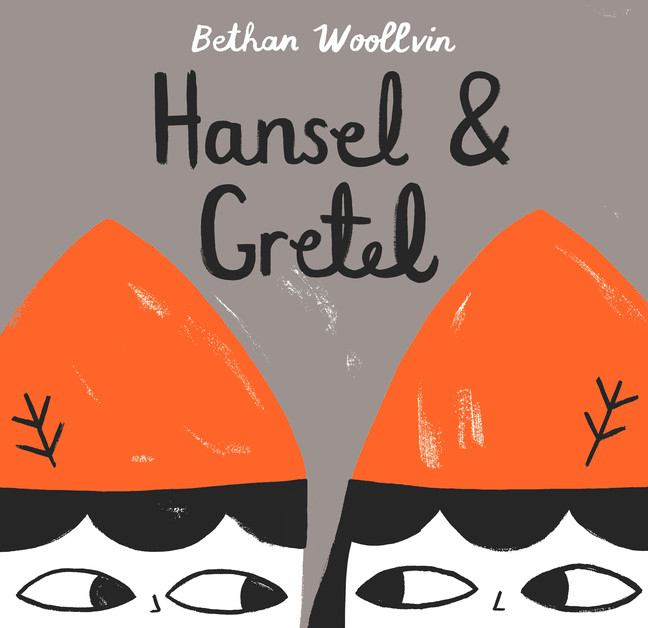October 8, 2018
The Reptile Club, and other great books
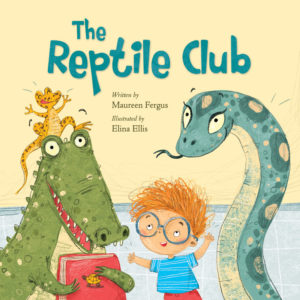 In lieu of a Picture Book Friday post, check out my round-up of great picture books for autumn—which includes the absolutely delightful The Reptile Club, by Maureen Fergus and Elina Ellis.
In lieu of a Picture Book Friday post, check out my round-up of great picture books for autumn—which includes the absolutely delightful The Reptile Club, by Maureen Fergus and Elina Ellis.
October 4, 2018
Notes For the Everlost, by Kate Inglis
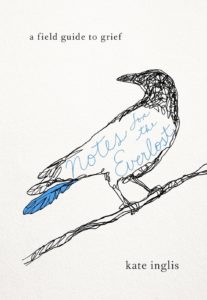 As an adult, the very first person I ever knew who was pregnant gave birth to a stillborn baby at full term, which would forever-after colour my understanding of pregnancy and its possibilities, and this understanding would be part of my impulse for creating The M Word many years later, to integrate experiences of loss into the motherhood story. Because a baby isn’t always the outcome of that story, or even a healthy baby—at least not at first. And neither is pregnancy the only path to a person’s understanding of what a mother does and what a mother is. There are so many ways to be a mother, for better or for worse, and in Notes For the Everlost: A Field Guide to Grief, Kate Inglis writes about the hardest way, which is to be a mother for a child who is no longer here.
As an adult, the very first person I ever knew who was pregnant gave birth to a stillborn baby at full term, which would forever-after colour my understanding of pregnancy and its possibilities, and this understanding would be part of my impulse for creating The M Word many years later, to integrate experiences of loss into the motherhood story. Because a baby isn’t always the outcome of that story, or even a healthy baby—at least not at first. And neither is pregnancy the only path to a person’s understanding of what a mother does and what a mother is. There are so many ways to be a mother, for better or for worse, and in Notes For the Everlost: A Field Guide to Grief, Kate Inglis writes about the hardest way, which is to be a mother for a child who is no longer here.
Now, there are several reasons why one might want to read a book subtitled “a field guide to grief.” Most obviously, if one is grieving—and Inglis has made this a practical book for such a situation, one informed by her experience of running an online forum for bereaved parents. Chapter One is titled, “The Immediate Protocol,” and the first guideline is, “Don’t apologize.” Chapter Three, “What Now,” is about finding one’s way through the first year, and it’s first sentence is, “You’ve got to get up and make breakfast.” There is good advice here, both for the bereft, but also for the people who love those who are grieving. Without being explicit, Inglis has also created a field guide for saying and doing not-terrible things around the grieving—when someone’s baby dies, don’t talk about your dead dog, please. “You will learn to surround yourself with people who understand that occasional sadness is not about them, and who never begin sentences with You should… unless they end with ...come over ’cause I just made soup.”
There’s a lot of generosity here though, toward those clumsy clods who don’t know what do say, or who say the wrong thing, who tell you that your baby’s in a better place now. Inglis writes about people whose miseries pale in comparison to hers—but also how others’ pain might make hers look slight. And what is this hierarchy anyway, and how we all takes turn being above and below. Inglis urges compassion from the grieving—for all those who are really doing their best, even when their best is awful. And there will be days when one can so generous, and other days when such generosity is not attainable, and grief is not a straight line, she writes. There is no perfect metaphor, for how it never goes away, and how it changes. She doesn’t write about “healing,” but instead about “integrating,” an ongoing process.
Another reason to read a book subtitled, “a field guide to grief,” or at least to read this one, is that because Notes for the Everlost is just an extraordinary literary creation—an engrossing and fascinating reading experience, rich with turns of phrase and imagery, as surprising and absorbing as any decent field guide should expect to be. I loved this book for its sentences and its structure, and for the harrowing, devastating story at its core, and the incredible writing, the reflection. A balance of love and anger, moving on and remembrance, holding on and letting go, living and dying, dark and light. As good as A Year of Magical Thinking, but a decade instead, what happens once the magical thinking is over, and even after that. Proof that living through tragedy is possible, even when you think you can’t or won’t. A book about death that—at its heart—is about life, and which dares to ask big questions without pretending to have all the answers.
October 3, 2018
Fall Books on the Radio
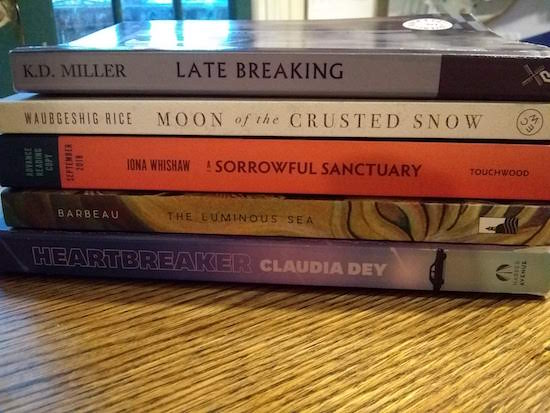
I was looking forward to my books column on CBC Ontario Morning today because these are five books I am really, emphatically excited about. Of course, I like all the books I recommended, but these ones in particular are standouts—and what a wonderful thing it is to be tasked with talking about things you really, really love. You can listen again on the podcast here—I come in around 23.40.
October 2, 2018
Staying Home to Read
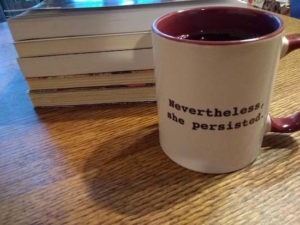
I read fifteen books last month, and some of them were really long, and so many of them were really good, and I’m pleased with this progress and with how much better I feel about the world knowing that these books are in it. Books that have reminded me: I really, really love reading, which is pretty much the root of everything I get up to these days. There is even time enough for it…which is always the thing I say around this time of year before I take on twenty stupid or less-stupid commitments that render such a statement untrue. But there is only time enough because I stayed home every night. Dear Writers: I am desperately sorry I wasn’t able to attend your literary gathering, but instead I was at home reading your book.
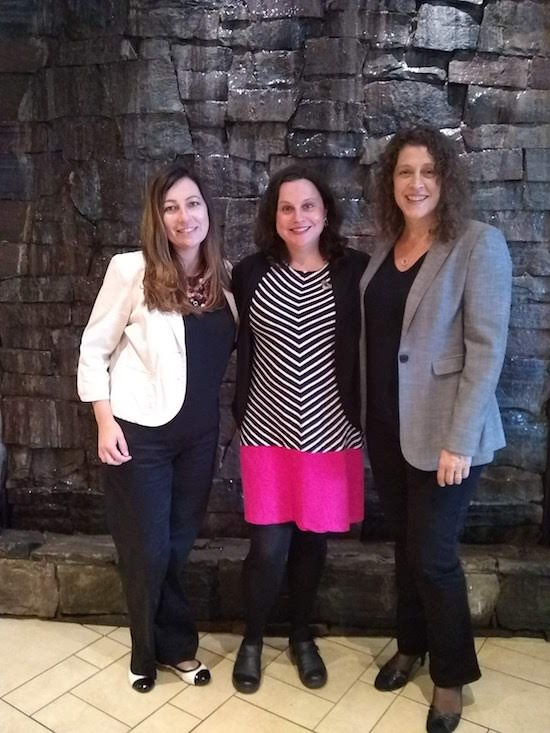
With just a couple of exceptions, of course. Last Saturday we had the pleasure of a weekend getaway to Huntsville, where I took part in the Huntsville Public Library’s Books and Brunch event with Hannah Mary McKinnon and K.A. Tucker. McKinnon’s most recent book is The Neighbours, which is the novel that kicked off my holiday reading in July, a twisty domestic drama that hinges on the premise of a woman’s ex-boyfriend moving in with his family to the house next door. Let me tell you how the situation turns out: NOT SO GREAT, ACTUALLY. And I read Tucker’s novel (her sixteenth, I think?), The Simple Wild, and I LOVED IT. It was funny, gripping and swoon-worthingly romantic in the way all my favourite 1990s’ films were. Together, the three of us had a fun and engaging conversation about writing, books, and publishing, and it was absolutely fabulous to be in such excellent company.
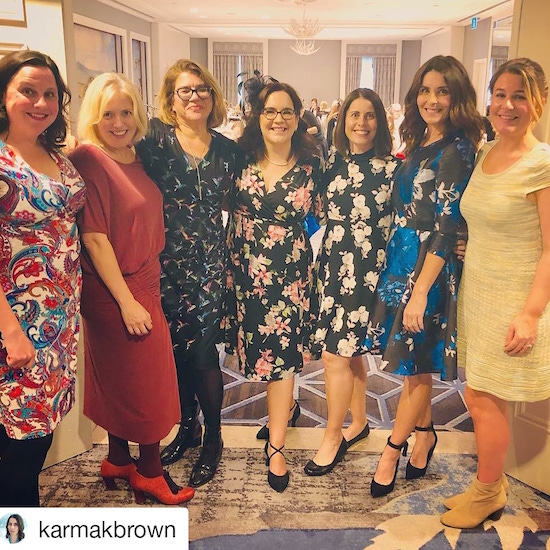
And then this weekend I found myself at another wonderful event, this time with members of my coven (because doesn’t every witch need a coven, and how fortunate I am that this one adopted me) celebrating Jennifer Robson’s forthcoming novel, The Gown. It was an afternoon tea, which is always up my street, and the food was divine, the bookish conversation delightful as we listened to Jen and Kate Quinn, and the table conversation was even better, as it always is when we get together. Definitely worth leaving the house for—which is not a phase I throw around lightly.
October 1, 2018
The Journey Prize Stories 30
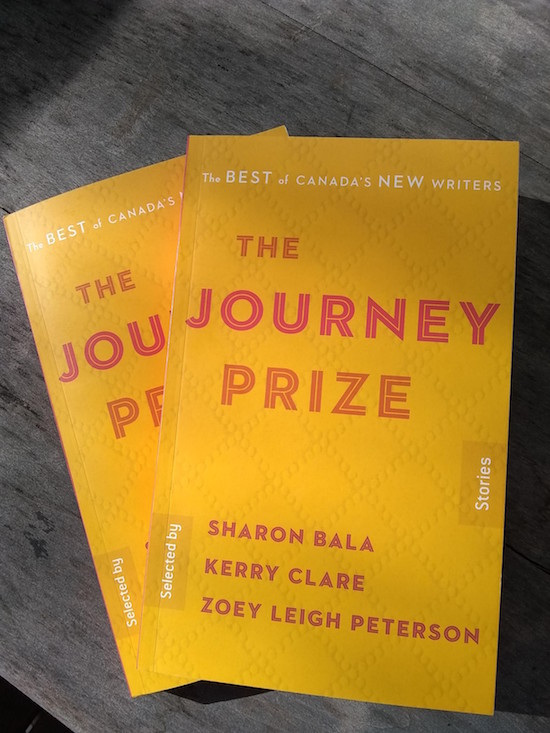
Seasons aside, a year is kind of an arbitrary span of time, but I love that my 2018 has been defined by the gestation of The Journey Prize Stories 30 and the experience of being a juror for the prize. It was January and the dead of winter when I received an email from McClelland and Stewart Editor Anita Chong with this amazing opportunity, and it was February and March as I read the stories, 100 of them, usually while my children were at Brownies or swimming lessons, and I was the woman with the giant bundle of papers. April and May were my conversations with co-jurors Sharon Bala and Zoey Leigh Peterson, which were so rewarding and inspiring and we learned a lot from each other (and then Sharon and I spent a day together at The FOLD in May, and my admiration for her was set in stone). Through May and June, we wrote our introduction together, and set the stories’ order, which was also terrifically interesting. And then our jury was announced in late July, the finalists not long after. And last week the book become available in stores, that giant bundle of papers rendered into something readable and magnificent. I’m reading it now, a story per night, revisiting these stories in a very different context from where I found them in the first place. What a journey, to be more than a bit corny. But I am really excited about this book. (And about the presentation of the winner at the Writers’ Trust Awards in November. The Journey Prize year goes on and on…)
Anyway, I now implore you all to go out and buy The Journey Prize Stories 30, because it’s such a rich and wonderful collection of stories. But I’ve got a second copy going that I want to give away to someone in the meantime. If you’d like a chance to win it (and have a Canadian address), please leave a comment on my blog or Facebook or Twitter or Instagram telling me what your favourite Canadian story, or story writer, or story collection is. Winner will be chosen Monday October 8.
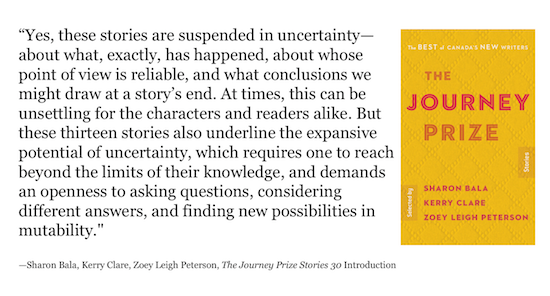
September 28, 2018
Mary Who Wrote Frankenstein, by Linda Bailey and Julia Sarda

“HOW DOES A STORY BEGIN? Sometimes it begins with a dream…”
I’ve been really looking forward to Mary Who Wrote Frankenstein, by Linda Bailey, illustrated by Julia Sarda, which brings together so many of my favourite things: Sarda’s creepy/gorgeous art—she also illustrated Kyo Maclear’s The Liszts; early feminist history with references with Mary Shelley’s mother, Mary Wollstonecraft (Shelley’s father, William Godwin, would teach her to read by tracing the letters of her mother’s gravestone; the fantastic story of the creation of the Frankenstein; and also the character of Mary Shelley herself, bookish and rebellious. By the time she is a teenager, Bailey writes, Mary “has become a Big Problem,” and she’s sent to live away from her family in Scotland. “But at sixteen, when she returns to her family, she is still a Big Problem.”
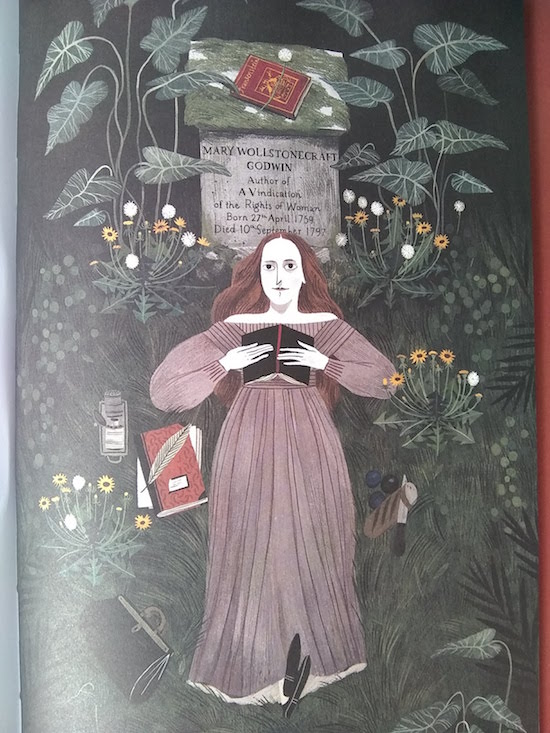
“And what does she do next?” the story continues. “She becomes an even Bigger Problem. She runs away with a brilliant young poet…” In dark and brooding spreads, we see Mary Shelley and her companions travelling through Europe, meeting up with Lord Byron in Switzerland, and that dark and stormy night with the ghost story contest 200 years that has since become the stuff of legends and birthed one of the most famous stories ever told.
Throughout the story and detailed in the illustrations are all the seeds that would culminate in the Frankenstein story, intermingled with an emphasis on tales and dreamy, and steeped in a delightfully creepy aesthetic. Readers discover that powerful stories can come from unlikely places—even an eighteen-year-old girl who wasn’t sure she’d have a story to tell. We see the way that the borders between stories, dreams and life are fuzzy, and how they overlap in places—and the incredible possibilities this offers for what we can make of our lives.
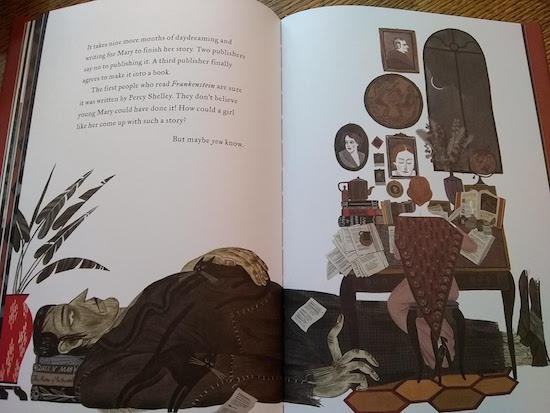
September 27, 2018
No Choice, by Kate McKenna
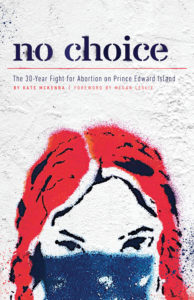 I think it’s because it just make sense to take for granted the things that one should take for granted (such as bodily autonomy) that feminist history seems to so often be overwritten. After I had an abortion in 2002, it would take years before I properly understood that I was fortunate to be able to access the procedure in such a straightforward manner. It never even occurred to me that I wouldn’t be able to. I had no idea that just ten years previous, in 1992, an abortion clinic around the corner from where I now live had been firebombed. Such recent violent history—in my own neighbourhood—but I hadn’t been paying attention.
I think it’s because it just make sense to take for granted the things that one should take for granted (such as bodily autonomy) that feminist history seems to so often be overwritten. After I had an abortion in 2002, it would take years before I properly understood that I was fortunate to be able to access the procedure in such a straightforward manner. It never even occurred to me that I wouldn’t be able to. I had no idea that just ten years previous, in 1992, an abortion clinic around the corner from where I now live had been firebombed. Such recent violent history—in my own neighbourhood—but I hadn’t been paying attention.
And nor did I understand that across Canada, even now, access to abortion was varied and even impossible—particularly for women in rural areas and across the Maritimes. In her book No Choice: The 30-Year Fight for Abortion on Prince Edward Island, Kate McKenna explains the power held by the Catholic Church in PEI and how that power enabled pro-choice activists to stack hospital boards by 1986 so that not a single abortion would be performed there for 30 years afterwards. She also shows how the the fight by pro-choice activists was exhausting, marked by setback and after setback. It didn’t help that in such a small and conservative province, people speaking up for the pro-choice cause could find themselves targeted and alienated. (For a long time I thought the history of progressivism was one of triumph. I read a biography of Jane Jacobs two years ago, and recall someone telling me that the real reason Jacobs stands out is that she’s one of the few fighters who ever managed to win.)
For a long time on Prince Edward Island, nobody won. After activism in the 1980s and 1990s, the pro-choice movement on PEI had mostly faded away. Women who found themselves pregnant would have to travel out of province for an abortion, and for many women (particularly those who were vulnerable and/or low-income) this was impossible. Women who returned home after these abortions were unable to access the aftercare they needed, sometimes with dire consequences. McKenna writes about women she knew pooling funds for “abortion insurance.” But in 2011, things started to change. It was a perfect confluence of events that no one could have planned—the rise of social media that allowed women to share and tell their stories; an activist group McKenna and her friends started to counter an annual “right-to-life” event in Charlottetown; enough time having passed for feminists to have forgotten the future was hopeless, I suppose; data from researchers at the University of Prince Edward Island; women who were willing to be public with their abortion stories; a guerrilla campaign of posters featuring the striking image shown on McKenna’s book cover. By 2016, PEI had a new Premier who was willing to consider an alternative to that “status-quo” that so many other politicians had been so comfortable with—McKenna quotes activist Professor Colleen MacQuarrie as being exasperated by this focus on status-quo, “Like it was a good compromise. Women’s health against…people that feel a little uncomfortable with the idea of abortion.”
On March 30, 2016, the PEI government announced that they would create a reproductive health centre in Summerside, PEI, that would offer abortions, among other services. After thirty years of fighting, the women of PEI had won the right to healthcare that millions of other Canadian women had access to. But the story isn’t over—in feminism, it never is. No doubt, the pro-life forces are still at work in PEI, and Anne Kingston has written about their plans to play a major in the 2018 Federal Election. And so that end, it’s smart to know what Canadian women are going to be up against, and to learn that there is value in fighting, that the battle can be won,
September 26, 2018
Spending a Morning at School
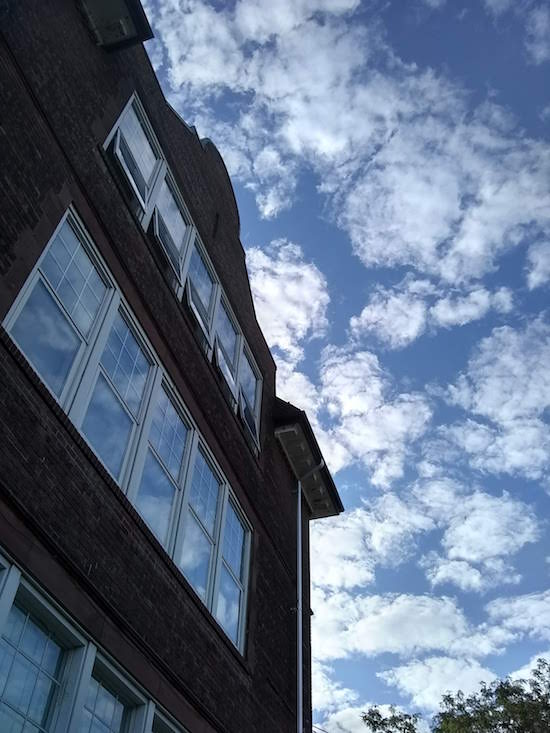
“All those beautiful back to school pics are a reminder (to me, anyway) of how deeply vested so many people are in the education system & that it can be political dynamite to mess with it recklessly.” —Shawn Micallef
One reason I like volunteering at my children’s school is because I’m nosy. And when a nosy person commits to spending a few hours administrating a fundraiser from the office—sorting order forms by classes with letters to parents—that person is not simply organizing papers. She is paying attention. And she is welcome to be there paying attention as she shuffles papers, because she’s going to be bringing in a few hundred extra dollars to the school coffers, which are chronically underfunded. Every little bit helps, and teachers and school administrators are expert at stretching those dollars at far as possible, finding value, and making them count. So I’m happy to help, and besides, there are plenty of places for me to work—the Vice Principal’s office? The nurse’s room? Because, of course, there is no money either for Vice Principals and Nurses anymore, and the Secretary relies on volunteer support. Speaking of stretched, and I’ve not even got to Education Assistants (gone the way of the Vice Principal…) or caretaking staff (of which there are a few, but as few as possible due to budget constraints). This is not austerity, but also I can’t remember the last time our provincial government made a major investment in public education. And yet there is something miraculous about the way it all functions anyway, credit for all of which is due to the amazingness of people.
Part of the reason it works is because we expect it to—every morning we drop off our children, those extensions of our hearts, and then we go out into the world to do the things we do, and we take it for granted that our children are safe and cared for, that they’re learning, that they’re even happy. And for many of our children, this is mostly true, at least on the good days. And when all our children went back to school in September I was struck by the reality that plenty of parents who were taking our schools for granted as much as I did had voted to elect a provincial government in June with no respect for teachers and a disdain for public education in general. (Our new Minister of Education’s background is managing a goat cooperative, and she has still given no media interviews about her portfolio which has been controversial since her government elected to dismiss an updated sex-ed curriculum [against the advice of experts] and cancel a curriculum rewrite that would have boosted Indigenous content. Her deputy is a twenty-one-year-old who was homeschooled and whose limited worldview is informed by his extreme religious views)
And how could they do that, I wondered. How could they send their children into the care of people whose profession their electoral votes had so undermined?
“Because they know teachers will still do the best possible job with their children,” answered my friend Dorothy Palmer when I posed that question on Facebook a few weeks ago, and Dorothy, a retired teacher would know. But I know too, or at least I’m reminded after the time I spent this week sorting papers in the office, paying attention. To the tiny people from kindergarten who had the huge responsibility of bringing the attendance down to the office this morning, in pairs of course. To the older girl who’d hurt her knee in gym and came to get ice, and also all the other people who came to get ice—after falling on the playground, getting hit by a soccer ball, going too wild on the monkey bars. Ice is the most tremendous tool, and it makes so many things okay again. Which the teachers know, the teachers who come into the office to check their mailboxes, who greet their colleagues jovially and say hi to students they haven’t seen since last year and remark on who has grown tall over the summer.
There was a little boy in the office this morning and it was his first day of school ever, and he was terrified, unhappy to be there. His dad was in the office filling out paperwork, but could hear his son crying down the hall where the boy was being comforted by an ECE. Over the course of my time in the office this morning, this small boy and his father were greeted by teachers, and welcomed to the school, and the kindergarten teacher came to ask if he wanted to come along to gym. When I finally left awhile later, the boy had joined his new class, no one was crying, and the relief on his father’s face in the hall reminded me of how good I felt when my eldest daughter finally stopped crying every morning for the first month of Junior Kindergarten, that maybe we could find a place here.
At our school, the Principal knows everybody’s name, and when it’s your birthday they put your name on the announcements and you get to come down to the office and receive a brand new pencil. The school Secretary is mostly magical and plays her guitar for the kindergarten classes. At our school, psychologists and speech therapists and other specialists visit to give support to kids who need it. My daughter has had occupational therapy help with handwriting, and speech therapy. When her Grade 3 teacher had concerns about her speech, she went back and talked to her teachers from the year before. At our school, our amazing music teacher retired after 28 years of teaching there, and (without her knowing) every single child at school, hundreds of them, had been taught a song just for her, and on her final day of school last year they sang to her, and a lot of people cried. (Our music teacher has not been replaced. What kind of school has music teachers anymore?)
I think sometimes people underestimate how good teachers are at doing their jobs, what experts they are in their professions. I absolutely know that the role of teachers in our society is shockingly undervalued, the incredible role these people play in our families’ day-to-day lives. A good teacher can change a life, and imagine what happens to a life when a kid has one good teacher after another. I sat in the office this morning, and said hello to a number of these teachers, and thought about what we’re trusting them with, up there with heart surgeons and bridge builders. Is there anyone more important?
Sit in a school office for a morning, and you get a glimpse into your community. Harried parents straggling in late, kids with disruptive behaviour, students living with their mothers in shelters because they’re fleeing family violence and the special needs that come with that. Our school specifies 10% of all money raised throughout the year go into a fund for students who are most in need, and this money has paid for eye glasses, winter clothing, gift cards at the holidays for families who wouldn’t otherwise be able to afford things. If a child shows up at school without a lunch for reasons other than a forgetful dad or mom, they will be quietly accommodated. Parents turn up with hugely pressing concerns which they seem blasé about, and others hysterical about incidental problems, and all of them are treated with care and consideration, and some other kid will arrive because he has a stomach ache and somebody will call his mom, and the day will continue, even after all my papers are filed. There is no such thing as extraordinary there, because everything is extraordinary all the time, and it works, because the people do, in spite of everything. I can’t imagine who’d we be without them.
September 25, 2018
Moon of the Crusted Snow, by Waubgeshig Rice
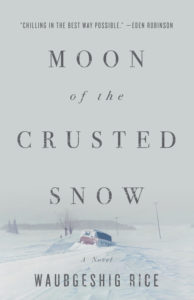 “‘Yes, apocalypse! What a silly word. I can tell you there’s no word like that in Ojibwe. Well, I never heard a word like that from my elders anyway.”
“‘Yes, apocalypse! What a silly word. I can tell you there’s no word like that in Ojibwe. Well, I never heard a word like that from my elders anyway.”
The first sign that something is wrong is the home satellites stop working, TV screens gone dead. “We might actually have to have a conversation,” Nicole tells her partner Evan when he comes from hunting a moose, and they will pass the evening without their usual entertainment. And by the morning, they’ve lost cell phone service, cell towers a pretty recent arrival in their remote northern community anyway—only built because contractors for the south wanted a signal while they built the hydro dam, and the tower stayed even after they were gone. But there’s no signal now, and soon the landlines will stop working, and the power grid will cease to function. Which raises two big questions: What has happened to the rest of the world? And the more immediately pressing one: how will their community get through the winter?
On the latter point, Evan has some advantages—he can hunt and has been storing food; he’s been reconnecting with the traditions of his Ancestors and this wisdom will guide him; and he and Nicole have built a stable life for their family, which will provide the emotional sustenance necessary to survive a dark and barren winter. But they are challenged when Southerners begin to arrive in the community, fleeing the devastation of towns and cities in the south—one of these men in particular is dangerous. And other members of the community prove to be susceptible to this man’s influence, which begins to divide them at a time when cooperation is essential.
Moon of the Crusted Snow is Waubgeshig Rice’s third book, and it’s gorgeously designed, the story itself quiet and subtle, but fast-paced with heavy overtones. Evan’s reconnection with Anishinaabe traditions as his community is becoming disconnected from the world around them sets up an interesting disjunction, and Rice shows the ways that he has consciously woven these traditions into the life of the family he’s created with Nicole, and how these connections serve them when the situation becomes particularly dire. Evan is also learning the Ojibwe language of his people, and this language is included seamlessly in the text without the use of italics or translation, which offers the text an additional layer of meaning to those who can read Ojibwe—does “zhaagnaash” really mean “helpful friend” I wonder, when used toward Scott, the man who has arrived in their community with big guns and survivalist tendencies?
And yes, there is no Ojibwe word for “apocalypse,” which Evan learns through a conversation with Aileen, an Elder whose teachings he carries with him. Aileen explains to Evan that their world isn’t ending—it already ended long ago when settlers arrived. “When the Zhaagnaash cut down all the trees and fished all the fish and forced us out of there, that’s when our world ended.” But they survived—this is her point. They learned to adapt, and to survive, even as their children were taken and abused in residential schools for generations. “But we always survived,” she tells Evan. “We’re still here. And we’ll still be here, even if the power and the radios don’t come back on, and we never see any white people ever again.”
The ending of this novel is powerful, unexpected, and while deeply satisfying, it’s also ambiguous in a really fascinating way. Moon of the Crusted Snow is a terrific, gripping novel, and one of the highlights of my literary autumn.
September 21, 2018
Hansel & Gretel, by Bethan Woollen
Things get a bit weird in Bethan Woollen’s Hansel & Gretel, which is a book you’ve probably got to get if you’ve read her Little Red and Repunzel and you have completist tendencies. See photo below for what I’m talking about:
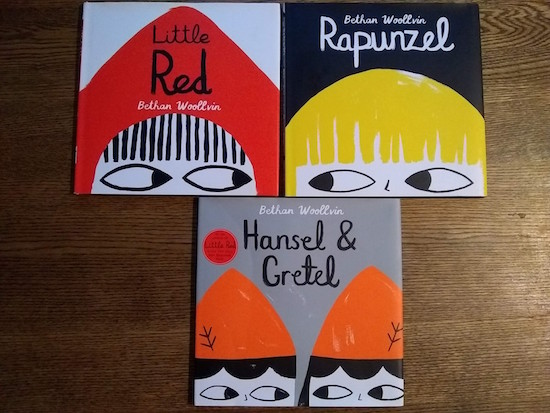
Once again, Woollvin is revising a fairy tale we think we know, but this time she’s telling it from a different point of view. Yes, a house made out of gingerbread might turn out to be all too tempting for a brother and sister who are lost in the woods, but luring children wasn’t what the good witch Willow had in mind when she conjured the spell to build her house. A miscalculation, maybe, but when Hansel and Gretel come tramping through the woods scattering breadcrumbs, which are sure to lure mice and other pests and therefore put Willows gingerbread house at risk, she politely asks them to clean up the crumbs, which they refuse. And when she has her back turned cleaning up the crumbs herself, the recalcitrant pair begin snacking on the house, which might be the final straw for some witches, but not this witch, who determines Hansel and Gretel must be hungry and invites them to come in for dinner.
It turns out that Hanesel and Gretel have no manners at all, however, and they gobble up all of Willow’s food, then start messing with her spells and wands, turn the black cat gigantic, and then Gretel stuffs Willow into the oven so she and her brother can continue to make trouble—but then the house is so full over magic, it explodes: “It was only made out of gingerbread after all.”
And so it is here that Willow finally decides to get her comeuppance, concocting a nasty bit of revenge that Hansel and Gretel completely had coming, and which hearkens back to a bit of fairy tale darkness worthy of Grimm’s.
